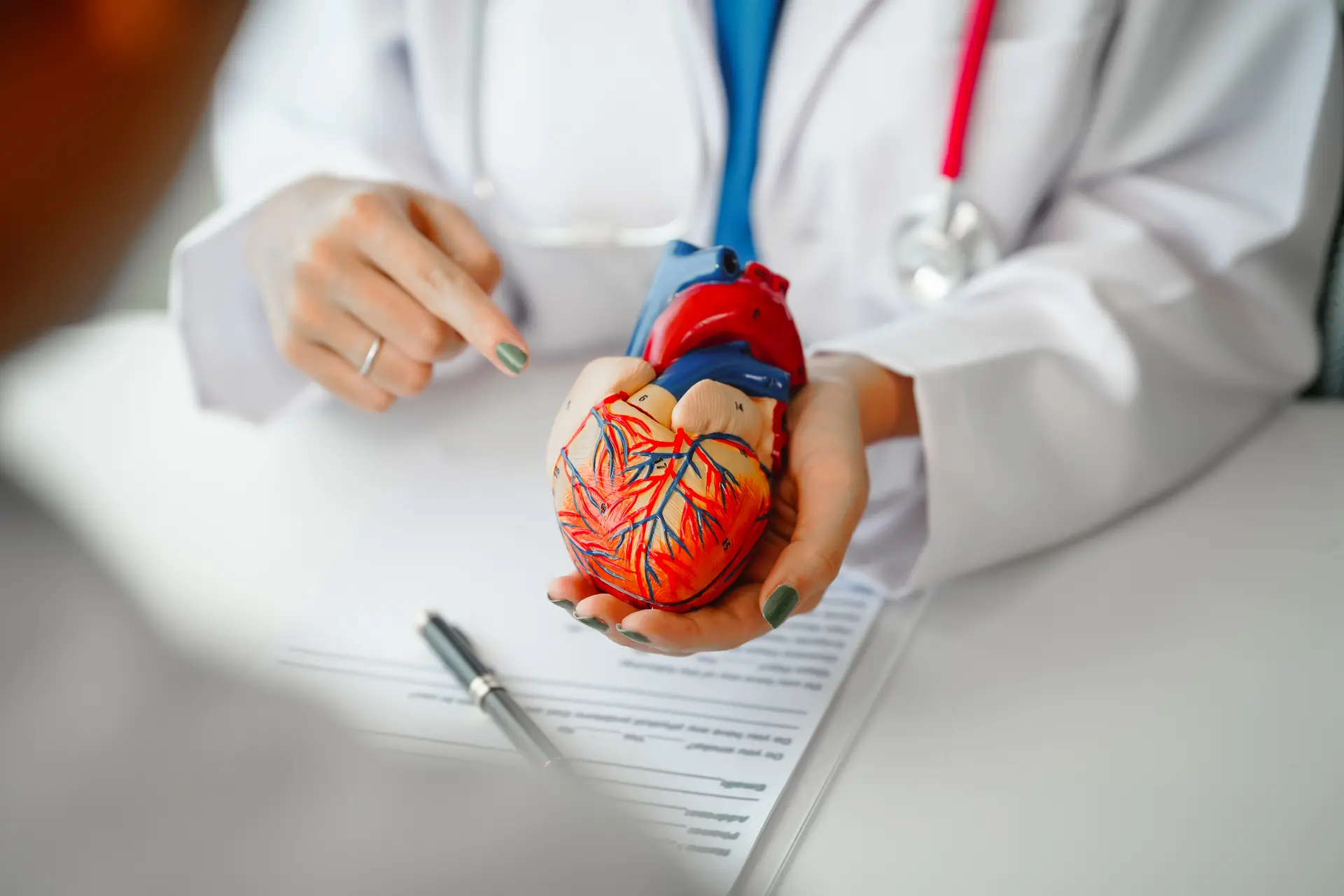The 3 Main Types of Cholesterol: What You Need to Know for a Healthier Heart
Cholesterol often gets a bad reputation – but not all cholesterol is harmful. In fact, your body needs certain types of cholesterol to function properly. However, an imbalance in your cholesterol levels can lead to serious health concerns, including heart disease and stroke.
To better understand the link between cholesterol and heart health, it’s important to know the three main types of cholesterol: HDL, LDL and VLDL. Each plays a different role in the body, and each has a different impact on your health.
What Is Cholesterol?
Cholesterol is a waxy, fat-like substance (a lipid) found in every cell of your body. While some cholesterol comes from the food you eat – especially animal products like meat, dairy and eggs – your liver also produces cholesterol naturally.
Cholesterol helps the body produce hormones, vitamin D and substances that assist in digesting food. However, too much of certain types of cholesterol can increase your risk of cardiovascular disease. This is why understanding cholesterol levels – and how to manage them – is so important for long-term wellness.
Understanding Cholesterol Levels
A cholesterol test (also known as a lipid panel) measures several components in your blood, including:
- Total cholesterol
- HDL cholesterol
- LDL cholesterol
- Triglycerides
In South Africa, regular cholesterol screening is a critical step in preventing heart-related illnesses, particularly for individuals with a family history of cardiovascular disease. As part of broader South African cholesterol education campaigns, health professionals encourage adults to know their numbers and take proactive steps to manage their heart health.
Let’s break down the key types of cholesterol:
HDL Cholesterol: The “Good” Cholesterol
What Is HDL Cholesterol?
HDL stands for high-density lipoprotein. It’s commonly referred to as the “good” cholesterol because it helps remove excess cholesterol from the bloodstream. HDL carries cholesterol away from the arteries and back to the liver, where it’s broken down and excreted.
Higher HDL levels are linked to a lower risk of heart disease. That’s because HDL helps prevent the buildup of fatty deposits (plaque) in the arteries. Think of it as a cleanup crew for your cardiovascular system.
Healthy HDL levels typically sit at 1.0 mmol/L or higher for men and 1.2 mmol/L or higher for women. If your HDL is too low, your doctor may recommend lifestyle changes to help raise it safely.
LDL Cholesterol: The “Bad” Cholesterol
What Is LDL Cholesterol?
LDL stands for low-density lipoprotein and is often referred to as “bad” cholesterol. It carries cholesterol to the cells, but when there’s too much LDL in the bloodstream, it can accumulate in the walls of the arteries, forming plaque.
Over time, this plaque narrows the arteries and restricts blood flow – a condition known as atherosclerosis. This increases the risk of blood clots, which can trigger heart attacks or strokes.
In the conversation around “good” vs. “bad” cholesterol, LDL is firmly in the latter category. Ideally, LDL levels should be below 3.0 mmol/L in healthy individuals, and even lower in those at high risk for cardiovascular disease.
VLDL Cholesterol: The Often-Overlooked Risk Factor
What Is VLDL cholesterol?
VLDL stands for very-low-density lipoprotein. While it’s less commonly discussed, VLDL plays a significant role in lipid health. It transports triglycerides – a type of fat – through the blood. Like LDL, VLDL contributes to plaque formation in the arteries.
VLDL is not typically measured directly but is estimated as part of a lipid panel. High VLDL levels are associated with obesity, insulin resistance, type 2 diabetes and a diet high in refined carbohydrates.
When discussing HDL, LDL and VLDL, it’s important to know that while VLDL is technically a separate category, it functions similarly to LDL and is also considered a “bad” cholesterol due to its role in artery-clogging plaque.
Triglycerides: Another Key Component
Triglycerides are not cholesterol, but they are measured alongside cholesterol in a standard lipid panel. These fats are produced when your body stores unused calories – usually from sugar and carbohydrates. High triglyceride levels are often seen in people with high total cholesterol, high LDL and low HDL.
Elevated triglycerides increase your risk of cardiovascular disease and are strongly influenced by lifestyle factors such as:
- Excessive alcohol consumption
- Smoking
- Physical inactivity
- Being overweight or obese
- Poor diet (especially one high in processed foods and sugar)
Your doctor may focus on both triglycerides and VLDL levels when evaluating your overall heart health.
Cholesterol and Heart Health
An imbalance in your cholesterol, especially high LDL or VLDL and low HDL, can lead to narrowed or blocked arteries, reduced blood flow and ultimately heart attacks or strokes.
That’s why cholesterol and heart health go hand in hand. Managing your lipid profile is a crucial part of preventing cardiovascular disease, particularly in countries like South Africa, where lifestyle-related illnesses are on the rise.
Healthy Cholesterol Ranges
Here’s a quick summary of healthy cholesterol ranges for most adults:
Total cholesterol: 200 mg/dl
HDL: 40 mg/dl or higher for men; 50 mg/dl or higher for women
LDL: Less than 100 mg/dl
Triglycerides: Less than 149 mg/dl
Non-HDL: Less than 130 mg/dl
Your doctor may recommend different targets depending on your overall health and risk factors.
How to Manage Your Cholesterol
The good news is that many cholesterol risk factors are manageable. Here’s how you can take control:
Eat a heart-healthy diet
Focus on whole grains, fruits, vegetables, nuts, seeds, lean protein and healthy fats. Limit saturated fats, trans fats and refined carbohydrates.
Exercise regularly
Aim for at least 30 minutes of moderate-intensity activity (like brisk walking) most days of the week.
Quit smoking
Tobacco lowers HDL levels and damages the arteries, accelerating plaque formation.
Limit alcohol
While moderate red wine intake has been loosely linked to HDL improvements, excessive drinking raises triglycerides and VLDL.
Manage your weight
Even a modest weight loss can help improve your cholesterol levels.
Follow your doctor’s advice
In some cases, lifestyle changes aren’t enough. Your physician may prescribe medication, especially if you have persistently high LDL or VLDL levels.
Regular Testing Is Key
Routine cholesterol testing is essential for understanding cholesterol levels and spotting changes early. Speak to your healthcare provider about when and how often you should be tested based on your age, family history and risk factors.
Final Thoughts
When it comes to cholesterol, knowledge is power. Understanding the difference between HDL, LDL and VLDL – and their impact on your body – can help you make informed choices about your health.
If you’re unsure about your numbers or how to improve them, speak to your healthcare provider. At Lenmed, we’re committed to empowering patients with expert-led cholesterol education in South Africa, so you can take charge of your well-being and protect your heart for the long term.
If you would like to speak to a professional about your or someone you love’s heart health, contact a Lenmed general practitioner or cardiologist today.
















